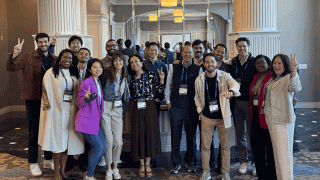What is the USC Rossier EdTech Accelerator?
Each year, approximately 15 education technology startups join the USC Education Technology Accelerator—a pioneering, university-based program with a singular mission: to harness the power of innovation in order to increase educational access and improve learning outcomes.
Founded in 2017 by USC Rossier Senior Fellow Doug Lynch and run by Associate Professor Mark DeGennaro, the Accelerator has become a distinctive fixture in the edtech landscape. Unlike many accelerators that require relocation or equity participation, USC Rossier’s program remains virtual, free and custom-tailored to the needs of each cohort. This design reflects the belief that true educational innovation must be both accessible and grounded in the realities of learners, educators and institutions. In this context, “we look for efficacious technology solutions which have the potential to create meaningful impact, and we then help entrepreneurs innovate and accelerate growth,” said Lynch, who has worked at the intersection of entrepreneurship, innovation and learning for over thirty years.
The ventures that pass through this program are as diverse as the problems they seek to solve—ranging from an AI-driven microchip e-learning platform to tools that streamline mental health access in schools. Yet, the thread that binds them is a commitment to solving education’s most pressing challenges with the assistance of technology. Added DeGennaro, “you not only have to identify a problem that you want to address through a technology solution, you need to develop a product that actually solves that problem and that someone wants to buy and use—while also learning how to run a business, attract and retain talent, define your value proposition, effectively market, acquire customers, raise capital, etc. That’s where our program comes in.”
This article introduces four representative entrepreneurs from the program’s growing portfolio. The program will open up applications for its next cohort in September 2025.
Greg Bybee, co-founder and CEO of Avela
Greg Bybee wasn’t a stranger to the startup space when he joined MIT professors, Nobel Prize winner Joshua Angrist and Parag Pathak to found Avela in 2020, an edtech company focused on helping families navigate the often-confusing school enrollment process. Before Avela, the Harvard and Stanford graduate worked at Microsoft, McKinsey, NewSchools, Coursera and NovoEd, a startup focused on providing online courses for professionals looking to upskill. Although Greg had worked in K–12, he had little experience selling to district buyers and navigating their complex sales cycles.
Avela offers a suite of tools that help families navigate school choice while providing districts with modern, equity-oriented enrollment infrastructure. The company is comprised of four platforms that serve different needs: Avela Apply, which helps families manage the enrollment process; Avela Enroll, which streamlines the enrollment process; Avela Match, which helps families find charter schools in their area; and Avela Explore, which is a product that helps families find the best school for their children The ultimate goal for Avela is to increase access to K–12 education, whether that be to charter schools, private schools or after-school programs.
Bybee credits the USC EdTech Accelerator for helping him learn and navigate the nuances of K–12 procurement, to better articulate Avela’s value proposition to districts and investors, and build his professional network, which includes his fellow cohort members with whom he still regularly communicates. “No matter how many companies you’ve started, you still need that network, [you need] friends you can brainstorm with,” noted Bybee, who from time to time taps Mark and Doug for informal advice.
Since completing the accelerator program, Avela has scaled nationally, serving districts from Boston to Philadelphia, and closed a $5.5 million seed round, shortly after Bybee’s mainstage pitch at ASU-GSV, an education conference where companies in the USC Edtech Accelerator pitch to venture capitalists for funding. “Having this program leading up to my fundraiser was very useful. If someone had to pick a time to do it, that is the time to do it. One of the things Mark and Doug focus on is communication, articulating your value,” Bybee said.
Ola Fadiran, founder and CEO of ChipMango
Ola Fadiran, a proud double Trojan who earned a master’s degree from USC Viterbi School of Engineering and an MBA from the USC Marshall School of Business, was initially drawn to the USC EdTech Accelerator precisely because of its affiliation with USC. He had trusted the school to give him the education he needed to succeed, so applying to a USC technology accelerator that caters to education was an easy decision.
Fadiran is the founder of ChipMango, a STEM-focused, AI-enabled skills-based learning platform dedicated to advancing education and workforce development in microelectronics and microchip design. ChipMango’s mission is to bridge the growing talent gap in the microchip industry by equipping learners with the technical skills and practical experience needed to thrive in this critical field.
ChipMango works closely with universities and community colleges across the United States, delivering trusted, high-quality curriculum that aligns with the standards of top engineering institutions. ChipMango also collaborates directly with microchip manufacturers to co-create industry-aligned certifications and hands-on learning modules, which it deploys throughout the higher education ecosystem. “By integrating real-world tools, workflows, and standards into the classroom, we help students transition seamlessly from the classroom to the chip design workforce,” said Fadiran.
ChipMango’s perspective is a global one. The company recently opened a design center in Nigeria, where Fadiran was born, and is working with the Nigerian government to create special training programs, focusing on upskilling a young and emerging population with the technical skills to compete with India and China. “We are now beginning to see the design skills outsourced to U.S. companies from Africa,” Fadiran said.
His time in the USC EdTech Accelerator equipped him with the knowledge to run a startup and helped him define his product market fit. “I was struggling with how to tell the story, and the program helped me translate a highly technical subject into a clear and compelling business narrative and reach, engage and partner with key industry players” says Fadiran. Looking back at this experience in the program, Fadiran has “nothing but appreciation: “the program has changed the lives of a lot of founders,” he says, “including mine.”
As Gen AI rapidly changes the technology sector, Fadiran hopes to see ChipMango become “the go-to edtech platform for microchip design and hardware.” And as traditional training methods continue to evolve, Fadiran believes ChipMango can play a major role in solving these workforce development challenges, giving people the ability to quickly upscale their skills to meet new demands of their current roles or transition to new positions.
Ben Greiner, founder and CEO of TadHealth
When Ben Greiner, a USC Dornsife graduate student and the founder of TadHealth, was in high school, a close friend of his suffered a mental health crisis. Greiner witnessed firsthand the frustrating and profoundly difficult experience of watching someone struggle to access timely mental health services.
While Greiner went on to complete his undergraduate degree in American studies and entrepreneurial studies from Hobart and William Smith Colleges and later played professional hockey in the U.S. and France, this experience stayed with him. It ultimately inspired the mission of TadHealth: “Reduce the steps to care” for mental health care services.
TadHealth is a digital platform that connects students to school-based counseling, serves as a one-stop shop for school resources available to students in need of counseling, and simplifies the delivery and reimbursement process for mental health care services, a major pain point for schools.
Greiner enrolled at USC Dornsife to pursue an MS in applied psychology and began bringing this seed of an idea for TadHealth to life. At USC Dornsife, he took courses in organizational development, which helped him understand the relationship between consumer psychology and marketing and how to establish a company’s foundation.
While at Dornsife, Greiner was accepted into the Viterbi Startup Garage and received early funding from the USC Viterbi School of Engineering. Greiner describes his participation in the startup garage as “an incredible experience.” His cohort included high-growth companies backed by top venture capital funds, and his fellow cohort members helped him in the early stages figure out “how to approach selling product and bridge connections to investors.”
David Eastman, the director of the Viterbi Startup Garage and a managing director of the Viterbi Venture Fund, added: “The Viterbi Startup Garage incubated TadHealth as a resident team for 18 months in 2022-2024, followed by an investment from the Viterbi Venture Fund last year. We're very pleased with the company's rapid growth since graduation and the value it's providing to school districts and counties throughout California as they manage the mental and emotional health needs of their students.”
When a colleague told him about the USC EdTech Accelerator Program, Greiner was immediately interested. While the USC Viterbi Startup Garage helped him get the company off the ground, he was eager to learn more about the education sector. He met Mark and Doug and applied to the program.
“It was a great experience,” Greiner says. The speakers were especially helpful, guiding him through the complex process of learning how to approach, partner with, and sell to K-12 school districts. Eastman added: “We know that TadHealth received great value from its participation in the USC Rossier EdTech Accelerator, and the company's success is a tribute to the value of the USC innovation ecosystem.”
TadHealth has experienced tremendous growth in the last few years, raising $5.5 million in funding, securing a new contract with the San Diego County Office of Education and expanding its offerings to include direct billing between schools and insurers. All this while never losing focus on its ultimate goal, which in Greiner’s view is “to get more support services to kids.”
Parminder Jassal, co-founder and CEO of Unmudl
Billing itself as a “skills-to-job marketplace,” Unmudl brings together employers, technical and community colleges and students who Unmudl founder and CEO Parminder Jassal describes as “working learners.” The company aims to address the shortage of trained technicians and to connect working learners with jobs and credentials. Unmudl is built on this symbiotic relationship: employers are able to either upskill existing workers or hire workers with the exact technical skills they need; colleges can increase their enrollment; and working learners are able to gain essential technical skills that can help them advance their careers.
Jassal, who earned her PhD in higher education economics from the University of Louisville, founded the company in 2019 with America’s Community and Technology Colleges. She has worked in the workforce development space for years, including at the Gates Foundation, and has always had a particular interest in connecting businesses with community colleges in a way that benefits the public good. She has always been more interested in “impact over profit,” she said.
While she came to the USC EdTech Accelerator program with experience in higher education and technology, Jassal had just started Unmudl, and the thing she needed more than anything else was feedback from people she could trust. Originally attracted to apply to the program because of the reputation of Doug Lynch, she felt his mentorship and the experience of the accelerator could help her discover solutions for some of the challenges she was facing running a startup.
For Jassal, the experience “was effective, impactful and just-in-time learning,” as the program gave her “practical advice from experts who knew the challenges.”
That advice paid off. With Amazon’s reliability and maintenance engineering team as its founding employer partner, Unmudl has rapidly grown into a national “Skills-to-Jobs® Marketplace,” now partnering with 106 employers and 48 community and technical colleges to offer over 100 high-impact job-aligned courses and in-person labs, Jassal said. Most recently, Unmudl expanded its collaboration with Amazon, giving employees direct access to next-level jobs and training paths that accelerate career mobility and unlock new opportunities for lifelong advancement.
“Employers should never have a void in their workforce, America’s community and technical colleges should be trusted partners,” Jassal said, and “for working learners, there should be no dead end. They should thrive, not just survive.” Added DeGennaro, “Given the need for life-long learning and regularly upskilling and reskilling of the workforce, we think Parminder’s model of partnering with employers and community colleges to offer specific skills training is compelling.”
A program for equity, a network for change
From its inception, the USC EdTech Accelerator has aimed to serve as more than just a launchpad for startups. It’s a platform for rigorous academic insight, practitioner expertise and entrepreneurial creativity. Founders are not only guided by mentors like Lynch and DeGennaro, but also supported by USC alumni and a robust network of educators, investors, advisors and policymakers.
What distinguishes the program isn’t just the success of its alumni—it’s the way each venture integrates innovation with purpose. As Doug Lynch notes, “the best educational technologies don’t simply digitize what’s broken. They reimagine what’s possible.”
Those who have gone through the program have no shortage of advice for those interested in applying. Jassal advises entrepreneurs to make sure the timing is right to take full advantage of the opportunities the program offers. Bybee adds, “Be honest and humble with what your gaps are and with what you need help with. Edtech is such a hard market. It is a mission, and having partners is invaluable.” It’s important to come to the program with “a community mindset,” Bybee says. Coming to the program knowing what you can contribute and give back to other cohort members is “what makes the program so special.”
As the Accelerator prepares to open applications for its next cohort in September 2025, it invites mission-driven entrepreneurs to bring forward their boldest ideas. The challenges in education are real, but so too is the talent and creativity needed to solve them.
Those ready to join this growing community of change-makers can learn more at the USC EdTech Accelerator website.





